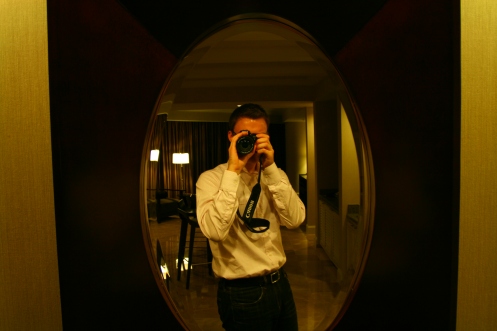Benjamin Wright
I’m a graduate student in the midst of writing my PhD dissertation at Carleton University in Ottawa, Canada. I’ve recently relocated to Toronto — my hometown — to research and write my thesis. My project addresses the ways in which film sound technologies such as Dolby Digital have changed industrial practice and aesthetic style in contemporary Hollywood cinema. My other research interests include the history of Jewish humor in film and television, the style of Steven Spielberg, the history of widescreen technologies, and “schlock” movies from the 1970s. I have published in a variety of cinema and media journals including The Journal of Popular Culture, Music Sound and the Moving Image, Film & History, and Offscreen.
My blog will hopefully reach others who have similar interests in film style, image and sound technology, television comedy, film music, and the Hollywood film industry. More than anything else, really, my blog is a big distraction from my thesis.
I can be reached at mametesque@gmail.com.


Loved the article on the Dark Knight. As a former Boom Op in Toronto and longtime film nerd the topic (and your writing) resonated.
Hi Benjamin,
My advisor, Dr. Katherine Spring, altered me to your blog. Like you, I am tackling sound for my dissertation, only I am still in my first year of my PhD. I would like to get in touch with you to discuss sound related issues. If you could please email me, it would be much appreciated.
Benjamin,
Your posting, “Slow Burn”, is one of the most intelligent and thoughtful analyses I’ve ever read on the deserving significance of Zimmer’s better filmscore techniques and moments. I am a 2006 graduate of Arizona State University in Music Composition and I once did a presentation on Zimmer for a film music class. It was a shame that our teacher spent 90% of the semester talking about film music pre-1970 and could only bring herself to speak about classical composers like Corigliano and Glass as if they were the most significant examples of “modern” filmscoring. I’ll give them their credit, but honestly, they haven’t spent their professional lives perfecting filmscoring like Zimmer. Other than an insulting presentation on Williams, and a noble attempt to at least introduce an example of electronic music (Vangelis’ Blade Runner) I was the only person to present on a living composer.
As I recall, my paper/presentation focused on Zimmer’s diverse use of three musical influences: classical, popular (esp. rock and the use of pervasive percussion), and ethnic music. Zimmer seamlessly navigates any possible fusion and juxtaposition of these areas, especially in terms of instrumentation. Each filmscore has its own area(s) of focus, but Zimmer’s overall style is marked by the synthesis of electronic and acoustic sounds and the compositional techniques you so aptly described in your posting. Although he is influenced by just about anything, he maintains a distinct aesthetic that is unique to his time and place. He’s not the most gifted composer in the traditional sense of counterpoint or strict orchestration. Nor do I think he could approach guys like Williams in harmonic rhythm (ie. fast paced and diverse changing of harmonies). But his ability to create atmosphere and move the emotions with simple yet profound themes achieves a totally new sense of musical height and breadth. In my humble opinion, this is his to claim in music history, and it could not have been achieved without his courageous exploration of synthesizing electronic and acoustic instruments, and synthesizing the traditions of classical, popular, and ethnic music.
Thanks for your thoughts. I haven’t had the strength or motivation to continue on with a career in music, but I’m glad others like you are succeeding where I failed. If you’re able to bear it, keep pursuing your dreams.
Best Regards,
Mark Jansen
Hi,
I wanted to write and tell you about a new website for filmmakers, musicians, artists, and fashion designers: www.PutItOn.com. I’ve been using the site as an artist and have my work there, and am trying to support. Basically, the site allows artists from all over the world to connect, display their portfolios, and sell their work (with no commission taken). The site gives artists a free gigabyte of space to showcase their portfolios, allows you to stream audio and video works, lets you create live personal broadcasts, and translates any writing into ten different languages. If you could take the time to visit the site, and if you like it too, let your readers know about it, and even sign up yourself or link to it on your site it would be greatly appreciated! We are trying to make a go of helping out artists everywhere and are trying to get the word out, so please help us out if you like the site after checking it out!
Thank you!
[…] Benjamin Wright via aspectratio.wordpress.com […]
Death of the Title Sequence | Title Design Project: Best of Motion Graphics said this on April 4, 2012 at 9:41 am |